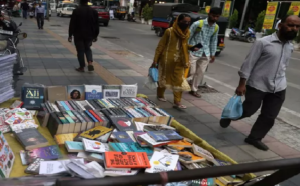11-08-2025
SRINAGAR, KASHMIR: Hafsa Kanjwal’s book on Kashmir has just been banned, but it’s the irony of the moment that strikes her the most.
This week, authorities in India-administered Kashmir proscribed 25 books authored by acclaimed scholars, writers and journalists.
 The banned books include Kanjwal’s Colonizing Kashmir: State‑Building under Indian Occupation but even as the ban was followed by police raids on several bookstores in the region’s biggest city, Srinagar, during which they seized books on the blacklist, Indian officials are holding a book festival in the city on the banks of Dal Lake.
The banned books include Kanjwal’s Colonizing Kashmir: State‑Building under Indian Occupation but even as the ban was followed by police raids on several bookstores in the region’s biggest city, Srinagar, during which they seized books on the blacklist, Indian officials are holding a book festival in the city on the banks of Dal Lake.
“Nothing is surprising about this ban, which comes at a moment when the level of censorship and surveillance in Kashmir since 2019 has reached absurd heights,” Kanjwal told Al Jazeera, referring to India’s crackdown on the region since it revoked Kashmir’s semiautonomous status six years ago.
“It is, of course, even more absurd that this ban comes at a time when the Indian army is simultaneously promoting book reading and literature through a state-sponsored Chinar Book Festival.”
Yet even with Kashmir’s long history of facing censorship, the book bans represent to many critics a particularly sweeping attempt by New Delhi to assert control over academia in the disputed region.
The 25 books banned by the government offer a detailed overview of the events surrounding the Partition of India and the reasons why Kashmir became such an intransigent territorial dispute to begin with.
They include writings like Azadi by Booker Prize winner Arundhati Roy, Human Rights Violations in Kashmir by Piotr Balcerowicz and Agnieszka Kuszewska, Kashmiris’ Fight for Freedom by Mohd Yusaf Saraf, Kashmir Politics and Plebiscite by Abdul Gockhami Jabbar and Do You Remember Kunan Poshpora? by Essar Batool. These are books that directly speak to rights abuses and massacres in Kashmir and promises broken by the Indian state.
 Then there are books like Kanjwal’s, journalist Anuradha Bhasin’s A Dismantled State: The Untold Story of Kashmir After Article 370 and legal scholar AG Noorani’s The Kashmir Dispute 1947-2012, which dissect the region’s political journey over the decades.
Then there are books like Kanjwal’s, journalist Anuradha Bhasin’s A Dismantled State: The Untold Story of Kashmir After Article 370 and legal scholar AG Noorani’s The Kashmir Dispute 1947-2012, which dissect the region’s political journey over the decades.
The dispute in Kashmir dates back to 1947 when the departing British cleaved the Indian subcontinent into the two dominions of India and Pakistan. Muslim-majority Kashmir’s Hindu king sought to be independent of both, but after Pakistan-backed fighters entered a part of the region, he agreed to join India on the condition that Kashmir enjoy a special status within the new union with some autonomy guaranteed under the Indian Constitution but the Kashmiri people were never asked what they wanted, and India repeatedly rebuffed demands for a United Nations-sponsored plebiscite.
Discontent against Indian rule simmered on and off and exploded into an armed uprising against India in 1989 in response to allegations of election fixing.
Kanjwal’s Colonizing Kashmir sheds light on the complicated ways in which the Indian government under its first prime minister, Jawaharlal Nehru, consolidated its control over Kashmir.
Some of Nehru’s decisions that have come under criticism include the unceremonious dismissal of the region’s leader Sheikh Abdullah, who advocated for self-rule for Kashmir, and the decision to replace him with his lieutenant, Bakshi Ghulam Muhammad, whose 10 years in office were marked by the strengthening of New Delhi’s rule of Indian-administered Kashmir. (Al Jazeera)
 Pressmediaofindia
Pressmediaofindia




